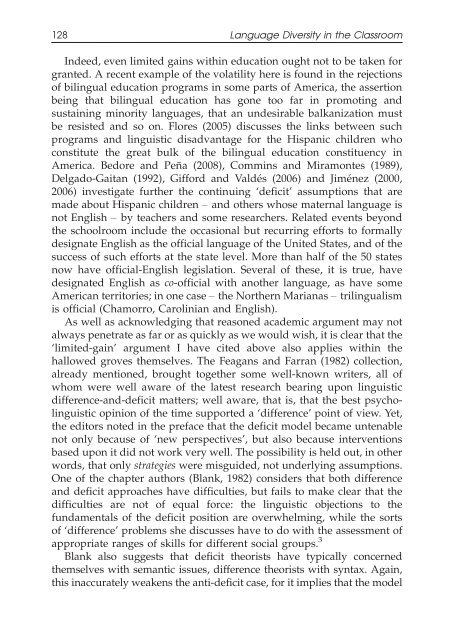Language Diversity in the Classroom - ymerleksi - home
Language Diversity in the Classroom - ymerleksi - home
Language Diversity in the Classroom - ymerleksi - home
- No tags were found...
You also want an ePaper? Increase the reach of your titles
YUMPU automatically turns print PDFs into web optimized ePapers that Google loves.
128 <strong>Language</strong> <strong>Diversity</strong> <strong>in</strong> <strong>the</strong> <strong>Classroom</strong>Indeed, even limited ga<strong>in</strong>s with<strong>in</strong> education ought not to be taken forgranted. A recent example of <strong>the</strong> volatility here is found <strong>in</strong> <strong>the</strong> rejectionsof bil<strong>in</strong>gual education programs <strong>in</strong> some parts of America, <strong>the</strong> assertionbe<strong>in</strong>g that bil<strong>in</strong>gual education has gone too far <strong>in</strong> promot<strong>in</strong>g andsusta<strong>in</strong><strong>in</strong>g m<strong>in</strong>ority languages, that an undesirable balkanization mustbe resisted and so on. Flores (2005) discusses <strong>the</strong> l<strong>in</strong>ks between suchprograms and l<strong>in</strong>guistic disadvantage for <strong>the</strong> Hispanic children whoconstitute <strong>the</strong> great bulk of <strong>the</strong> bil<strong>in</strong>gual education constituency <strong>in</strong>America. Bedore and Peña (2008), Comm<strong>in</strong>s and Miramontes (1989),Delgado-Gaitan (1992), Gifford and Valdés (2006) and Jiménez (2000,2006) <strong>in</strong>vestigate fur<strong>the</strong>r <strong>the</strong> cont<strong>in</strong>u<strong>in</strong>g ‘deficit’ assumptions that aremade about Hispanic children and o<strong>the</strong>rs whose maternal language isnot English by teachers and some researchers. Related events beyond<strong>the</strong> schoolroom <strong>in</strong>clude <strong>the</strong> occasional but recurr<strong>in</strong>g efforts to formallydesignate English as <strong>the</strong> official language of <strong>the</strong> United States, and of <strong>the</strong>success of such efforts at <strong>the</strong> state level. More than half of <strong>the</strong> 50 statesnow have official-English legislation. Several of <strong>the</strong>se, it is true, havedesignated English as co-official with ano<strong>the</strong>r language, as have someAmerican territories; <strong>in</strong> one case <strong>the</strong> Nor<strong>the</strong>rn Marianas tril<strong>in</strong>gualismis official (Chamorro, Carol<strong>in</strong>ian and English).As well as acknowledg<strong>in</strong>g that reasoned academic argument may notalways penetrate as far or as quickly as we would wish, it is clear that <strong>the</strong>‘limited-ga<strong>in</strong>’ argument I have cited above also applies with<strong>in</strong> <strong>the</strong>hallowed groves <strong>the</strong>mselves. The Feagans and Farran (1982) collection,already mentioned, brought toge<strong>the</strong>r some well-known writers, all ofwhom were well aware of <strong>the</strong> latest research bear<strong>in</strong>g upon l<strong>in</strong>guisticdifference-and-deficit matters; well aware, that is, that <strong>the</strong> best psychol<strong>in</strong>guisticop<strong>in</strong>ion of <strong>the</strong> time supported a ‘difference’ po<strong>in</strong>t of view. Yet,<strong>the</strong> editors noted <strong>in</strong> <strong>the</strong> preface that <strong>the</strong> deficit model became untenablenot only because of ‘new perspectives’, but also because <strong>in</strong>terventionsbased upon it did not work very well. The possibility is held out, <strong>in</strong> o<strong>the</strong>rwords, that only strategies were misguided, not underly<strong>in</strong>g assumptions.One of <strong>the</strong> chapter authors (Blank, 1982) considers that both differenceand deficit approaches have difficulties, but fails to make clear that <strong>the</strong>difficulties are not of equal force: <strong>the</strong> l<strong>in</strong>guistic objections to <strong>the</strong>fundamentals of <strong>the</strong> deficit position are overwhelm<strong>in</strong>g, while <strong>the</strong> sortsof ‘difference’ problems she discusses have to do with <strong>the</strong> assessment ofappropriate ranges of skills for different social groups. 3Blank also suggests that deficit <strong>the</strong>orists have typically concerned<strong>the</strong>mselves with semantic issues, difference <strong>the</strong>orists with syntax. Aga<strong>in</strong>,this <strong>in</strong>accurately weakens <strong>the</strong> anti-deficit case, for it implies that <strong>the</strong> model
















